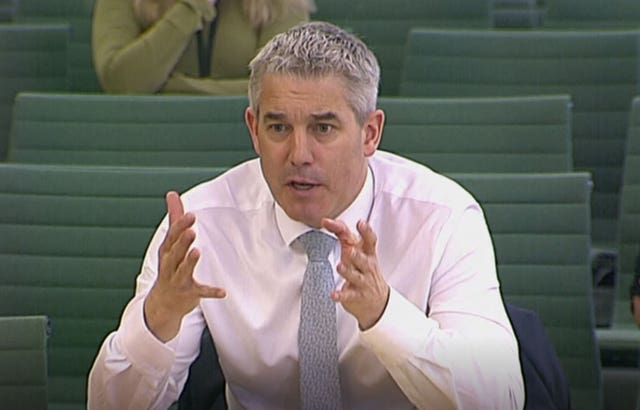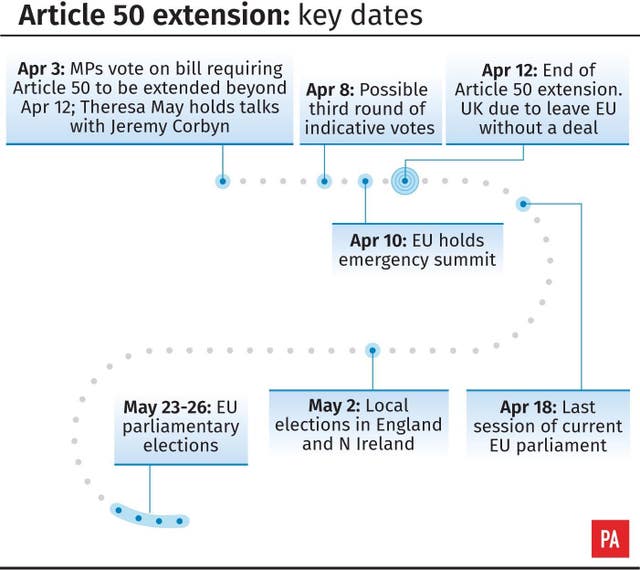
Theresa May has been hit by the resignation of a Leave-backing minister as she prepares to hold talks with Jeremy Corbyn which the Government accepts are likely to lead to a “softer” Brexit.
Wales minister and whip Nigel Adams said the Prime Minister had made a “grave error” by reaching out to the Labour leader in the hope of finding a consensus solution to Brexit ahead of a crunch EU summit on April 10.

Mrs May announced her dramatic move after a marathon session of Cabinet at which a number of ministers are understood to have argued for a no-deal EU withdrawal next week.
In his letter, Mr Adams said the Government faced two “great challenges” of delivering “the Brexit the people voted for” and preventing a Corbyn premiership.
Following yesterday’s cabinet, this morning I’ve been to Downing Street & resigned my position as UK Govt Minister for Wales & Govt Whip. I’m grateful to the PM for the opportunity to serve as a Minister since 2017 & will continue to serve my constituents from the backbenches. pic.twitter.com/W15xS4cOBP
— Nigel Adams MP (@nadams) April 3, 2019
He added: “Sadly, I fear that we are now at risk of simultaneously failing in both.”
The Selby & Ainsty MP – a close ally of Boris Johnson who took part in planning for his abortive push for the leadership in 2016 – said: “Legitimising and turning to Jeremy Corbyn to assist you at this crucial stage, rather than being bold, is a grave error.
“It is clear that we will now end up in the customs union. That is not the Brexit my constituents were promised and it is contrary to the pledge we made in our manifesto. It makes no sense to leave the EU and to have a situation where our trade policy and much of our law is made in Brussels with no say for the UK.”

Mr Adams, who was made a whip in January 2018 and promoted to the Wales Office in November, said he continued to believe no deal was better than a bad deal.
“It now seems that you and your Cabinet have decided that a deal cooked up with a Marxist who has never once in his political life put British interests first is better than no deal, ” he told the PM. “I profoundly disagree with this approach.”
Mr Adams’s resignation is the first since Tuesday’s Cabinet meeting and came shortly after Brexit Secretary Stephen Barclay said a softer Brexit was the inevitable result of the political balance in the Commons.
Referring to a softer Brexit scenario, Mr Barclay told BBC Radio 4’s Today programme: “It’s undesirable, but it’s the remorseless logic of the numbers of the House of Commons.
“The Prime Minister’s deal won’t go through and no deal in law is taken off the table, then the consequence of that is either a soft Brexit or no Brexit at all.”
The Prime Minister’s offer to meet the Labour leader to try and end the impasse over EU withdrawal sparked fury among Tory Eurosceptics.

But Mr Barclay blamed hardliners in Tory ranks for the situation.
He said: “It’s regrettable that what we have been saying for several months now is coming to pass, but that is the remorseless logic of not backing the Prime Minister’s deal.
“Because the alternative then is to have to seek votes from the opposition benches because 35 of my own colleagues would not support the Prime Minister’s deal.”
The comments came after Mrs May said she will seek an Article 50 extension beyond next week to allow negotiations with the Labour leader aimed at ensuring the UK leaves the European Union “in a timely and orderly way”.
At Prime Minister’s Questions in the Commons, Mrs May said: “The purpose of meeting with the leader of the opposition today is to look at those areas we agree on.

“I think there are actually a number of areas we agree on in relation to Brexit. I think we both want to deliver leaving the EU with a deal. I think we both want to protect jobs. I think we both want to ensure that we end free movement. I think we both recognise the importance of the Withdrawal Agreement.
“What we want to do now is find a way forward that can command the support of this House and deliver on Brexit, deliver on the result of the referendum and ensure that people can continue to have trust in their politicians doing what they ask us to do.”
Mr Corbyn said he welcomed Mrs May’s “willingness to compromise to resolve the Brexit deadlock”, but otherwise avoided the issue during their weekly Commons clash.

Tory MP Jacob Rees-Mogg described the offer to Mr Corbyn as “deeply unsatisfactory” and accused Mrs May of planning to collaborate with “a known Marxist”.
The DUP said it “remains to be seen if sub-contracting out the future of Brexit to Jeremy Corbyn, someone whom the Conservatives have demonised for four years, will end happily”.
International Development Secretary Penny Mordaunt said: “The only way to leave is with the Withdrawal Agreement.
“The Prime Minister is trying to get it through on Conservative votes and has not been able to, she’s now trying to do it with Labour votes.”
Meanwhile, a cross-party group of MPs was attempting to force legislation to stop a no-deal Brexit through the Commons in a single day.
The single-clasue Bill tabled by Yvette Cooper requires the Prime Minister to table a motion seeking MPs’ approval for an extension to the Article 50 process beyond April 12 to a date of her choosing.
The group behind the Bill hopes once it has passed the Commons it could be approved by the House of Lords and granted Royal Assent in time for the emergency EU summit on April 10.
Mr Rees-Mogg claimed Remainers had taken control of Brexit and were “disenfranchising Leave voters”.
European Parliament Brexit coordinator Guy Verhofstadt, who had said he thought a no-deal Brexit was “nearly inevitable”, welcomed Mrs May’s offer of talks with Mr Corbyn.
If the European Council proposes an extension beyond May 22, it is understood that it would be possible for the UK to take the steps necessary to prepare for European Parliament elections on May 23, but then cancel them at the last minute if the withdrawal deal was ratified.


Comments: Our rules
We want our comments to be a lively and valuable part of our community - a place where readers can debate and engage with the most important local issues. The ability to comment on our stories is a privilege, not a right, however, and that privilege may be withdrawn if it is abused or misused.
Please report any comments that break our rules.
Read the rules hereLast Updated:
Report this comment Cancel